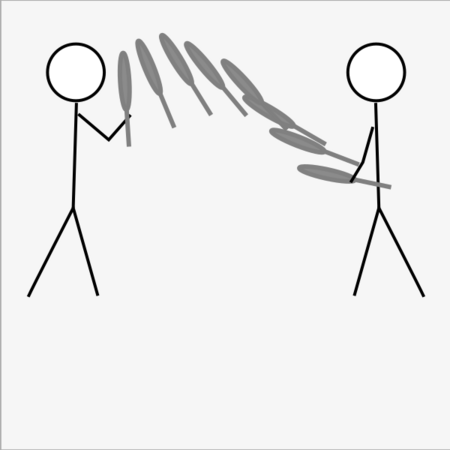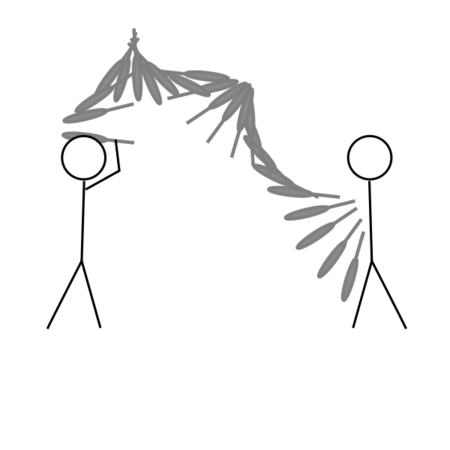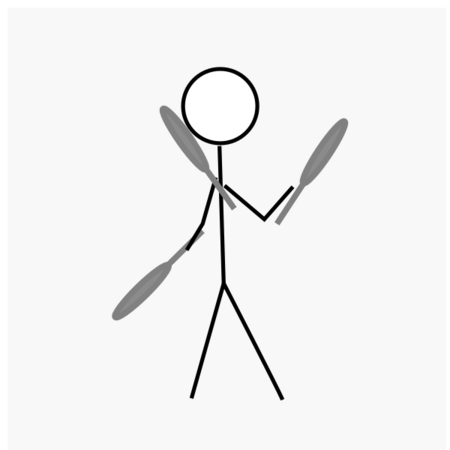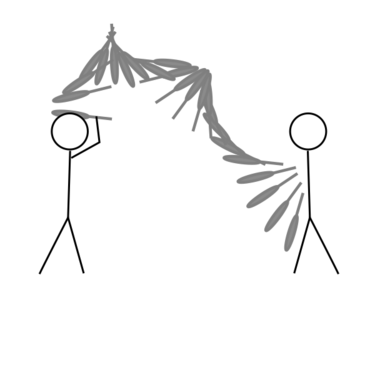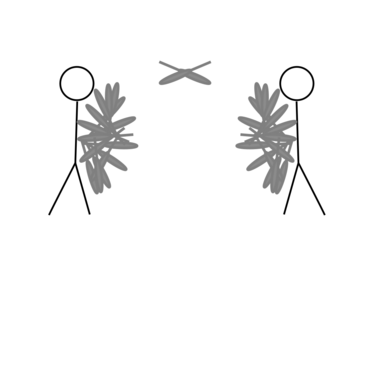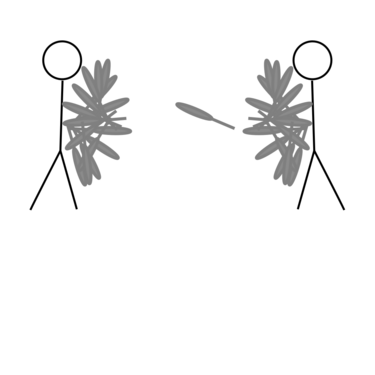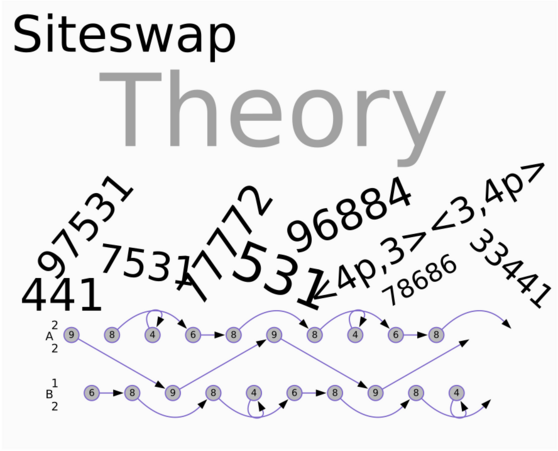Main Page: Difference between revisions
No edit summary |
No edit summary |
||
| (38 intermediate revisions by 2 users not shown) | |||
| Line 1: | Line 1: | ||
The goal of this wiki is to provide a collection of juggling patterns, organized into "learning paths" that contain patterns of increasing difficulty. |
The goal of this wiki is to provide a collection of juggling patterns, organized into "learning paths" that contain patterns of increasing difficulty. |
||
The wiki tries to answer the question: |
|||
<center><b>"What should I try learning next?"</b></center> |
|||
and also: |
|||
<center><b>"I want to learn this (for me right now difficult) pattern, how do I get there"</b></center> |
|||
There are many other juggling resources, but most of them do either provide no difficulty rating - or neglegt that there is more than one type of difficulty that a juggling pattern can have. Here, I tried to group patterns with common traits and also a common set of difficulty-types. |
|||
Entry points are provided for each type of throw, as each kind of throw needs a different throwing technique. |
Entry points are provided for each type of throw, as each kind of throw needs a different throwing technique. |
||
These entry points are labeled as "Beginning with [...]" and primarily focus on building proficiency with a single throw type before progressing to more complex patterns that incorporate multiple throw types. |
These entry points are labeled as "Beginning with [...]" and primarily focus on building proficiency with a single throw type before progressing to more complex patterns that incorporate multiple throw types. |
||
<!-- |
|||
| ⚫ | |||
| ⚫ | |||
| ⚫ | |||
| ⚫ | |||
== Entry Patterns == |
== Entry Patterns == |
||
| Line 9: | Line 26: | ||
These patterns are suitable for beginners. It helps a lot if one juggler is more experienced. All patterns only use one throw type (on the beginner side). Note that being suitable for beginners does not in all cases mean that these patterns are easy if you already have experience passing clubs. |
These patterns are suitable for beginners. It helps a lot if one juggler is more experienced. All patterns only use one throw type (on the beginner side). Note that being suitable for beginners does not in all cases mean that these patterns are easy if you already have experience passing clubs. |
||
| ⚫ | |||
<!--{| style="width:95%;text-align: center;" |
|||
| ⚫ | |||
|+ |
|||
| ⚫ | |||
|- |
|||
image:selfs.svg | link=Juggling 3 Objects Alone | <font size=+1> Juggling 3 Objects Alone</font> |
|||
| [[image:one-pass-notext.png |upright=1|thumb|none| link=Beginning Single Passes|<font size=+1> Beginning Single Passes</font>]] |
|||
| [[image:selfs.png |upright=0.69|thumb|none| link=Beginning Selfs - Juggling 3 Clubs| <font size=+1> Selfs - Juggling 3 Clubs</font>]] |
|||
|} |
|||
| ⚫ | |||
| ⚫ | |||
| ⚫ | |||
| ⚫ | |||
| ⚫ | |||
</gallery> |
</gallery> |
||
== Single-Passes // Zaps == |
|||
<gallery heights=250px widths=350px mode="packed-overlay" align="left"> <!--mode="packed-hover"--> |
|||
image:one-pass-notext.svg | link=Selfless Passing|<font size=+1> Selfless Passing<br> 4 to 7 clubs </font> |
|||
| ⚫ | |||
| ⚫ | |||
image:zapnips.svg | link=Zapnips (Zaps on Parsnips) | <font size=+1> Zaps on Parsnip </font> (Passes + Zaps) |
|||
</gallery> |
|||
== Theory == |
|||
<gallery heights=300px widths=300px mode="packed-overlay"> <!--mode="packed-hover"--> |
|||
image:Theory.svg | link=Siteswap | <font size=+1> Siteswap - Juggling Math |
|||
</gallery> |
|||
| ⚫ | |||
| ⚫ | |||
| ⚫ | |||
| ⚫ | |||
== |
== Double Passes== |
||
<gallery heights=300px widths= |
<gallery heights=300px widths=300px mode="packed-overlay"> <!--mode="packed-hover"--> |
||
image: |
image:7-club-2-count.svg | link=Double Passes | <font size=+1> Double Passes |
||
| ⚫ | |||
</gallery> |
</gallery> |
||
== |
== Heffs (Double Selfs) == |
||
<gallery heights=300px widths= |
<gallery heights=300px widths=300px mode="packed-overlay"> <!--mode="packed-hover"--> |
||
image: |
image:why-not.svg | link=Why-Not Family |<font size=+1> Why-Not Family </font> |
||
| ⚫ | |||
</gallery> |
</gallery> |
||
== |
<!-- == Holy Grail == |
||
Ok, I included this too early, because it was such a good story, although I hadn't progressed there myself. |
|||
The Patterns I collected aren't so good trainings patterns, as we figured out when trying ourselves because in period 5, the double passes trigger each other, which makes the patterns unstable more quickly, as any bad double pass leads to another bad double pass and onto a downward spiral |
|||
<gallery heights=300px widths=400px mode="packed-overlay"> <!--mode="packed-hover"--> |
<gallery heights=300px widths=400px mode="packed-overlay"> <!--mode="packed-hover"--> |
||
image: |
image:DragonsGrail.jpg | link=Quest for the Holy Grail|<font size=+1>Quest for the Holy Grail<br>(zaps+double passes)</font> |
||
| ⚫ | |||
</gallery> |
</gallery> |
||
| ⚫ | |||
== Other Juggling Resources == |
|||
[[Other Juggling Resources]] |
|||
== Unfinished == |
== Unfinished == |
||
Latest revision as of 09:55, 25 October 2024
The goal of this wiki is to provide a collection of juggling patterns, organized into "learning paths" that contain patterns of increasing difficulty.
The wiki tries to answer the question:
and also:
There are many other juggling resources, but most of them do either provide no difficulty rating - or neglegt that there is more than one type of difficulty that a juggling pattern can have. Here, I tried to group patterns with common traits and also a common set of difficulty-types.
Entry points are provided for each type of throw, as each kind of throw needs a different throwing technique.
These entry points are labeled as "Beginning with [...]" and primarily focus on building proficiency with a single throw type before progressing to more complex patterns that incorporate multiple throw types.
Entry Patterns
These patterns are suitable for beginners. It helps a lot if one juggler is more experienced. All patterns only use one throw type (on the beginner side). Note that being suitable for beginners does not in all cases mean that these patterns are easy if you already have experience passing clubs.
Single-Passes // Zaps
Theory
Double Passes
Heffs (Double Selfs)
image:DragonsGrail.jpg | link=Quest for the Holy Grail|Quest for the Holy Grail
(zaps+double passes)
</gallery>
-->
Other Juggling Resources
Unfinished
Todo main page overview of unwritten pages
